

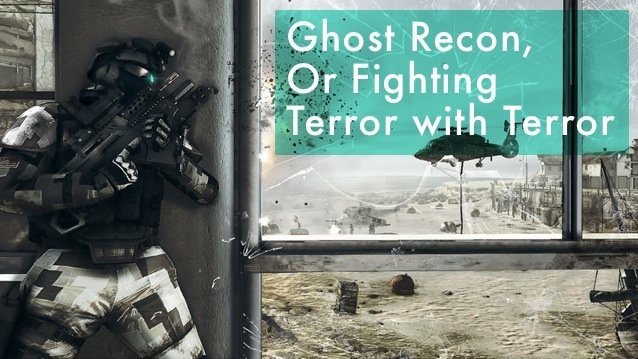
Back in June, Kate Cox wrote an article called “We Are Scared Right Now: What Today’s Video Games Say About The World We Live In”. In it, Cox discusses how videogame trends are mirroring our population’s greatest fears by living them on a fantastic scale, multiplying and magnifying them. She argues that as games continue to grow in popularity, the more we will see their presence in the national discussion. I agree with Cox’s conclusion that games reflect our own fears, but I think games are also showing us just how much we’re willing to give up to attain some prophetic notion of safety.
Western hypocrisy is our greatest weakness and our enemies’ greatest strength. Forged in some insoluble cauldron of chest thumping and bravado, we inform ourselves through well-trodden, circular paths of redundant illogic, building great temples of our might and right that fails to see anything that isn’t besotted with the promises of a democracy that even we have lost.
In Ghost Recon, I am the invisible terrorist -- the impetus behind that crush of humanity running around me, trying to avoid the barrel of my gun.In the US public school system, the British empire is more often than not considered the antagonist throughout. We learn of their subjugation of the Indies and Africa, of the Caribbean and the Americas. In our school system, the lesson is often that imperialism is wrong, but I can’t help but feel that the lesson I was supposed to learn was much more pointed -- that British imperialism is wrong, but that our American exceptionalism is completely different. Colonialism, we like to believe, is a completely different ballgame from "nation building," that barely opaque euphemism often used for propagating the US's latest puppet-government. Where one is carried out by red-clad nannies in powdered wigs and bad teeth, Americans do it out of the graciousness of our hearts. We are there to help the disenfranchised, to free people from the ruthless rule of tyrants and murderers (the same that we usually have a hand in putting in power in the first place, mind). If you buy into what I am calling the “Clancy Doctrine,” the USA is like the equivalent to some sort of cybernetic Robin Hood, a paragon of democracy and of Being Badass. Having long abandoned Roosevelt’s doctrine of walking softly and carrying a large stick, we now strut around with a stick in one hand, and a dagger in the other. Videogames seek to emulate this -- affirming American exceptionalism by glorifying the breaking Geneva Conventions and international law.
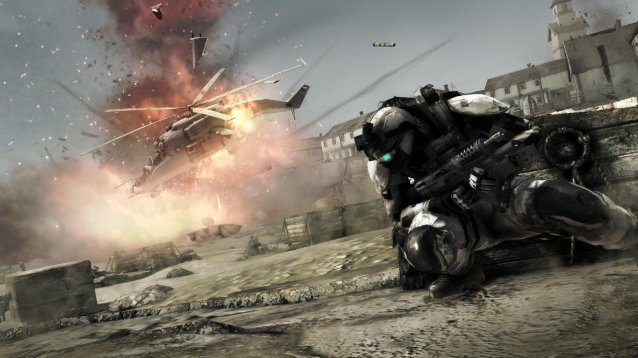
In Ghost Recon: Future Soldier, I romp through sovereign lands, invisible in a billion dollar uniform, apparently sowing seeds of justice and democracy, but all my actions really seem to make me into exactly the thing I am supposed to stop. In Ghost Recon, I am the invisible terrorist -- the impetus behind that crush of humanity running around me, trying to avoid the barrel of my gun.
Perhaps this is what living in a post-9/11 world is for Americans. Perhaps modern military tactics have become so clandestine as to have become impossible to discern from the very thing we are fighting against. These are our military heroes in videogames: men who break international law with the same flippancy that you might jaywalk or loiter. Flash to E3 and watch as Sam Fisher rips information out of people before slamming his blade into their necks. Go back to Modern Warfare 2 and listen as the general tells you that “You will lose a bit of yourself, but you will save countless lives.” What we’re talking about here is brutality in the name of the nebulous demigod of democracy, beset by evilness all over the world. We’re inundated constantly with the message that anti-terrorism is fought by terrorism and torture.
I don’t mean to reduce this into some sort of “first-person shooters make you violent” white horse that some people enjoy riding into the battlefield of morality. Instead, I bring this up to point out the way in which we enjoy this constant deluge of images of western imperialism, pushing back the natives with superior technology and our undying belief that what we’re doing is the Right Thing. Tom Clancy’s Ghost Recon: Future Soldier is not the first game to feature this sort of battlefield of binary morality, nor will it be the last -- if anything, E3 is a perfect example of this genre of preponderantly propagandized shooters is becoming more popular than ever.
Couched in the porn of bullet physics, blood spatter, and destructible environments lies the central message, differentiating Us and Them.The question I’m left with is this: Where does terrorism end? In seeking to define the boundaries of the term, I’m left thinking that it’s all about what flag you recognize yourself under. This, of course, leads to a deeply unsettling feeling that what I’m witnessing isn’t so much entertainment as it is propaganda. Couched in the porn of bullet physics, blood spatter, and destructible environments lies the central message, differentiating Us and Them.
But Clancy and Co. don’t want you to think this way -- in fact, they’ll do whatever they can so that you never feel as if you are doing anything that could be considered technically “bad.” So, they give you an evil warlord as a target. When the mission starts, you stop a woman from being assaulted. You are one of the good guys! Why they don’t just put an shimmering AR halo over your head and put devil horns on all your targets, I don’t quite understand. But then again, the grizzled general did say the suits were early builds, so maybe that piece of the augmented reality had yet to be implemented.
In the tutorial, you play as the leader of a ghost squad set to ambush a caravan carrying something terrorist-y, that must be stopped (obviously). Naturally, after mowing them down with your superior firepower in a shock and awe microcosm, you open the trunk to find (surprise!) a bomb! And so you run away in slow motion, but alas, not in time. You and your team die for your country, heroes.
In the first actual mission, the team jet sets off to Bolivia from North Carolina to pick up a drug runner who has information regarding the terrorist plot that killed the people in the first mission. We are in La Paz to rescue a man named Paez -- a man that, given slightly different circumstances, we would be here to kill.
Even before the first bullets are fired, the townspeople run from me with their hands over their heads in the cowering animation that will become a mainstay throughout the rest of my time with Ghost Recon. The first time you fire bullets, you take out gaggles of enemy combatants perched on rooftops in a crowded city square. You see your man, and you line up the shots. Then, you rain down hell. Explosions blossom and the bodies on the rooftops begin to fall. Collateral damage is imminent. The unsuspecting citizenry must now deal with this terrifying new situation.
By the time we can finally get to Paez, there is already a breadcrumb trail of black smoke billowing in our wake. He has been shot, and so I sling his arm around my shoulders, and act as his crutch as we push on through city streets. We get to a market where another firefight takes place and where I accidentally shoot a woman who got caught in the crossfire. I still remember watching her hit the ground. She was wearing a white blouse and a red skirt and as she hit the ground, the man holding the gun continued to fire on me. The next second, the camera swiveled again, and I was back to seeing a wall of men, firing their guns. There were many incidents of collateral damage in this market, I’m sure of it, but none seemed so especially poignant as this.
Perhaps it was just the way in which the camera moved so quickly after ending her life in a way that seemed to intone “it doesn’t matter,” but I couldn’t help but feeling that, for all the good I was apparently doing, I was doing just as much evil. Who would people at her funeral blame for her death? Were there people that counted on her? How many lives did I ruin from one misfired shot?
These aren’t questions that Ghost Recon asks. We have more important things to worry about.
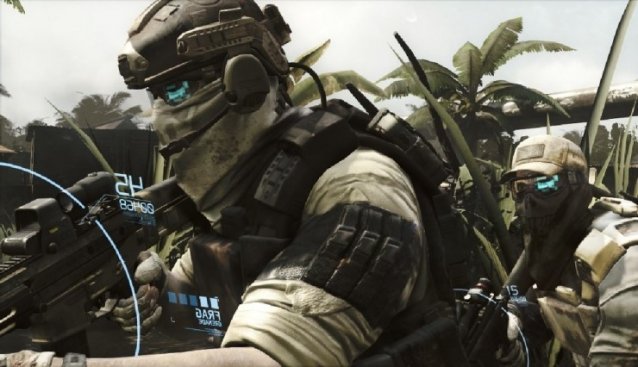
Even while I write this, I have misgivings. Maybe all of this was in some way planned. Maybe there is supposed to be a real question of warfare morality couched in the single player experience. Is this possible? Sure. Anything is. But with the sheer number of games that follow this same basic principle of fighting terror with terror, I fail to conceive this as anything more than a love of the valiant warrior, felling evil with a godlike justice, even if the message is sullied by that puff of red that blossomed on the woman’s shirt.
With Paez secure, we make our way to a refugee camp to take down a dangerous warlord who was apparently in on the bomb trade that we are fighting to stop. Clancy and Company present this guy in true dictatorial fashion: dark aviator sunglasses, beret, and soldered-on sneer. The important part in designing this guy was that he have absolutely no redeeming qualities. Villains in games like Ghost Recon must be comically over-the-top evil so as to avoid any question as to whether or not Geneva Convention-breaking assassinations are inappropriate, or even their own sort of (lesser?) evil. Throughout, we’re freeing these refugees from the tyrannical rule of the man who has stolen their food and enslaved them. It reminds me of the scene in Apocalypse Now where, after napalming a village, the cavalry lands among the terror they have wrought, and starts proclaiming “We are here to help.”
My squad is advancing through the refugee camp. Our mission is to walk right through the middle of the camp in our invisible clothes until we reach our target, and kill him. We will do this by marching in plain sight, blending into the fabric of the burlap tents, the arid dirt of the desert, and movements of the commoners. We will remain hidden, right until the moment that we want to be seen. On the way there, we perform casual bits of synchronized assassination, dropping men two, three, four at a time. They hit the ground and the innocents scream and scatter in all directions, knowing only that the men were killed, but not of what nor by whom. We are here to help.
It is in this way of shifting in and out of invisibility and making people see the brutality of our efficiency that shakes me. The cowering animations are all essentially the same on those who are not our enemies. They beat feet as far away from the blossoming flower of maroon mud pooling from the fallen man’s head as they can. We are here to help.
I remember putting my four men in position, hidden from the warlord and his three bodyguards and turning to my friend, confused that there wasn’t a cut-scene of taking this guy into custody. “Am I just supposed to shoot him?” I asked my friend. “Yeah, you kill all of them.” There’s no trial here. It should be noted that the warlord guy was on the phone talking about missiles or some other dastardly weapon of war. I set up the four assassination assignments and gave the go-ahead. The next second, the four targets hit the ground with a startling finality. I am not the jury or the judge, just the executioner. Don’t worry, we are here to help.
Through the rest of the mission, I deal with legions of the terrorist threats, trying to find us in their terrorist humvees through terrorist sand storms. Finally, we make it to the evac point where, in true military shooter fashion, we must hold off the hordes of soldiers arriving with their decade-old, Russian-manufactured AK-47s while the space-aged chopper replete with all manner of high-caliber guns mounted on its hull makes a thrilling rescue. To watch the chopper arrive in the nick of time and mow down out-gunned terrorists while being blasted by a hard rock guitar riff conjures up the image of a bald eagle with a single tear rolling out of its eye with a buffeting american flag behind it and glittery letters promising to NEVER FORGET.
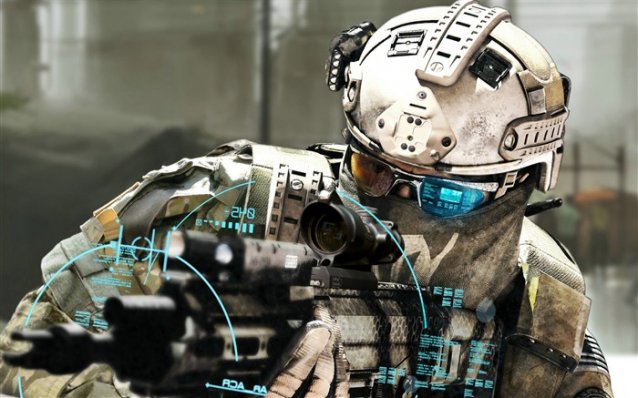
It would be less offensive if you didn’t know this wasn’t supposed to be a farce. It smacked of the Bush era Axis of Evil presentment of war -- a definitive all-powerful democratic Right, fighting the absolute jihadist Wrong.
When I finished the second mission of Ghost Recon: Future Soldier, I had killed more people than I cared to think about. I have left a city quaking in the wake of our mission to rescue a person who, given even slightly different circumstances, I would have been sent in to kill. While protecting him, I killed an innocent woman who got caught in the crossfire. I kicked a hornet’s nest of bad men who, after I left, would probably take out their rage, frustration, and depression out on the innocents we left high and dry. I left my friend’s house sometime later, feeling uneasy by the carnage I had wrought.
When I turned on my car, NPR was running a feature piece about reformed guerrillas who had once been the exact same sort of person I had just finished mowing down. It was a story of attempted salvation -- of humanity lost, recanted, and refound. It was a discussion of these soldiers who had run away from the insurgent paramilitary organizations they had joined and had attempted to fix the atrocities they had perpetuated. There were stories of attempted redemption, trying to make amends to the families they had torn apart by their violence. These were just men -- not psychopaths nor cold-blooded killers. They had committed atrocities, yes, but these acts were not committed in a vacuum. These people were distilled in that alembic of western exceptionalism, living through a lifetime of sorrow before they were ten, watching as foreigners roadie ran through their streets in space-age fabrics, blowing fist-sized holes through their bedroom walls before jetting out in a helicopter, leaving in their wake a smoking crater of collateral damage that included their mother whose white blouse was soiled in her own blood.
I talk about this not to proclaim that all of the people who fight in the name of some dictator or warlord will eventually make a recompense to the societies they have ravaged, but only that the million minion militias of dictators past, present, and future are not the nameless and faceless antagonists games like Ghost Recon make them out to be. Lost in this war are the human stories of attempted redemption.
Where is the game where you play an ex-paramilitary killer, trying to salvage his humanity by helping those families whom he has ruined? Would this sort of thing pass the muster of an American audience? I do wonder. I hope it would. What makes games so great and so powerful is that we can experience the life of another with a greater acquity than any other medium can provide. No other medium can get as close to seeing what it is like to walk in another person’s shoes. What I’m asking for are more varied experiences that help us what it’s like to be the other.
Game journalism has a role here as well. All of the press of this game has been based on whether the game is “good.” As said a thousand other times in a thousand various outlets, it’s no longer enough to talk about games in this way. In a world where the videogames have a hand in the cultural zeitgeist, AAA game developers and reviewers have a duty to discuss the topics presented in a game’s narrative, and not shy away from these troubling issues. Indeed, the more that we continue to speak of videogames as a product as opposed to the locus of a promulgated propaganda, we do ourselves and our audience a disservice by allowing these sixty-dollar propaganda posters to continue unabated. Enough about gameplay, let’s talk experience. Enough about graphics, let’s talk aesthetics.
There are games out there breaking the mold. Games like Spec Ops are challenging a marketplace laden with meatheaded monomorality by showing the true terrors of war, but in large part, we’re subjected to more of the same drowned out brown shooters that seem so indelibly linked to the modern military shooter.
I don’t say these things to damn the developers of Ghost Recon, Call of Duty, or Splinter Cell, but more to the games industry as a whole. We’re better than this. Let’s give the player something to at least consider while they’re mowing down terrorists. Let’s evolve this propagandized schlock into something that looks and feels more important. And as writers, let’s take our content more seriously, because if we don’t, surely no one else will. Let’s make death and destruction the tragedy that it is and stop glorifying and gamifying the dead bodies of those who will never have that chance at redemption because we called the shot.
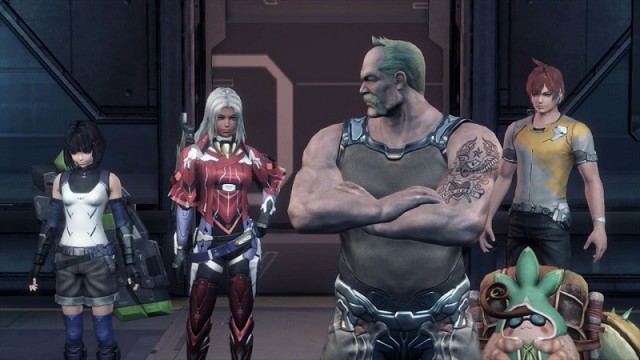
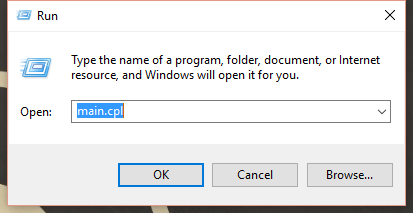
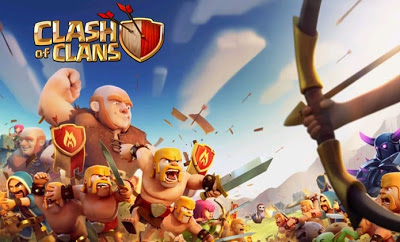
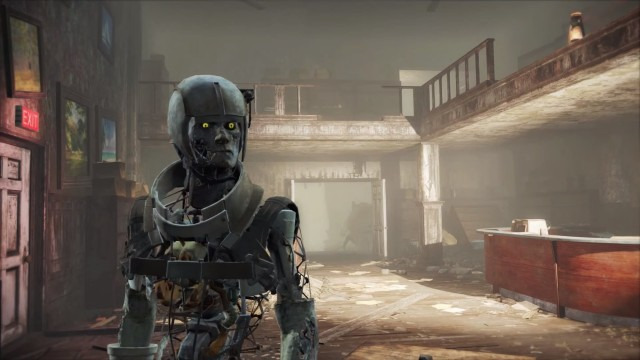
 Highest paying missions in GTA Online
Highest paying missions in GTA Online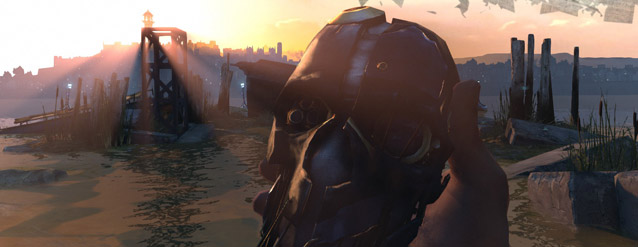 Dishonored Blueprint Locations Guide
Dishonored Blueprint Locations Guide Sia will have new song on 50 Shades of Grey Soundtrack
Sia will have new song on 50 Shades of Grey Soundtrack Review: AOC Q2963PM
Review: AOC Q2963PM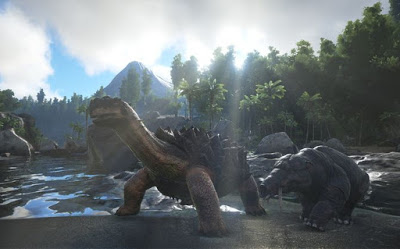 Ark - Survival Evolved (PC) Tame and Ride Dinosaurs
Ark - Survival Evolved (PC) Tame and Ride Dinosaurs